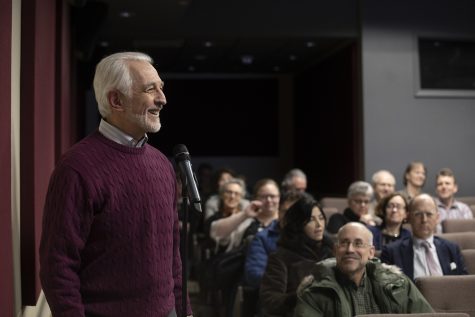Montserrat Fuentes, final UI provost candidate, discusses retention, opportunity
Fuentes, who currently works and Virginia Commonwealth University, spoke to the UI community Thursday afternoon about her goals should she get the provost job.
Montse Fuentes speaks during the provost forum on Thursday, February 7, 2019.
February 7, 2019
Students, staff, and faculty gathered on the afternoon of Feb. 7 in the IMU to hear from Montserrat Fuentes, the final University of Iowa executive vice president and provost candidate.
Fuentes, the dean of the College of Humanities and Sciences and a statistics professor at Virginia Commonwealth, said she is enthusiastic about the UI position because of its prominent role in research and the spirit of its students.
A university provost is the chief academic officer, and the job includes working with heads of departments and deans of colleges.
“There is so much to be proud of,” Fuentes said. “It’s a place where people want to come and want to stay.”

University of Iowa Honors Director Art Spisak asks a question during the provost forum on Feb. 7. This is the final provost candidate for the university.
As a first-generation college student in her family and first-generation of immigrants to the United States, Fuentes said, her main priority as provost would be to bring similar educational opportunities to others.
RELATED: Second provost finalist visits campus, discusses issues facing higher education
“Higher education is a pathway to transform lives,” Fuentes said. “In academic environments, we have brilliant minds, and we want to make use of that.”
She emphasized her experience in the field of college education and summed up her strategy for success in the form of the “three I’s”: innovation, integrated programs, and especially interdisciplinary teams.
“We need to be able to work across disciplines to create greater impact,” Fuentes said. “We need to work on what really matters, what really makes a difference in our society.”
The latter, Fuentes said, includes topics such as big data, race relations, sustainability, renewable energy, addiction, and health. Progress in these areas could offer students an education they value and thus increase retention, she said.
“The student demographic is changing, so we need to adapt,” Fuentes said. “Technology has changed who we are, so we need to adapt.”
To lead a public-research university such as the UI into the future, Fuentes said, as provost she would adhere to four core pillars: addressing community and societal problems, producing skilled professionals, fostering global engagement and diversity, and maintaining fiscal organization.
“It’s about the quality of our faculty, our staff, about relationships,” Fuentes said. “Once we have a set of priorities in place, we need to have a financial model that can achieve these goals.”
UI chemistry Associate Professor Christopher Cheatum asked Fuentes how she would fund research so that it encourages students to stay, as they consistently leave the state for more resourced opportunities.
“In public universities, we struggle these days in recruitment and especially retention,” Cheatum said. “Our students are leaving not because they’re not being paid well. They leave because they don’t have the resources available here.”
Fuentes said that while money does factor into the retention of research-focused students, sometimes they simply receive better offers elsewhere. However, she believes an infrastructure to support research must be in place at the UI.
RELATED: David DeJong, first candidate for UI provost, speaks at forum
UI graduate fellow Lance Bennett asked Fuentes about the future for graduate students.
“I have a question about how to make sure graduate students are well-prepared for the next stage of their career,” Bennett said. “What strategies do you think are the best for students … not pursuing academia?”
Fuentes’ answer focused on the importance of offering exposure to students’ potential careers, citing the advantages of the UI’s partnerships with possible employers and the importance of internships.
“Students — they are the reason we’re all here,” Fuentes said. “We need to make sure they are able to be trained to be successful.”






